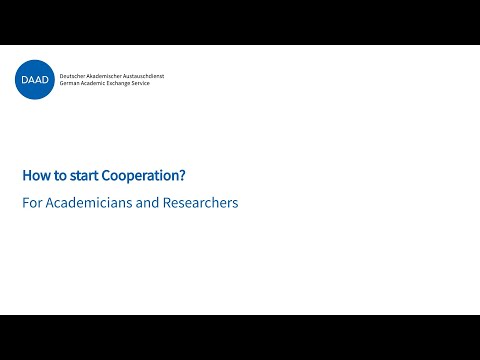- Cooperation Programmes and Funding – South Asia
- How to start cooperation?
- Funding Schemes
- Testimonials
- iHED - International Higher Education Dialogue
- Guidelines for Dual/Double & Joint Degree Programmes
How to start cooperation?
Here are some tips...

To activate the video, please click on the preview image. We would like to point out that after activation, data will be transmitted to the respective provider. View on Youtube
Funding Schemes
Study Visits for Groups of Foreign Students to Germany
Studienreisen für Gruppen ausländischer Studierender in Deutschland
Exposure to German higher education system and culture through visits to at least two German universities by a group of Indian students.
Guest Lectureships for Professors at German Universities
Gastdozentenprogramm
This programme invites an Indian faculty to teach at a German university.
Long-term Lectureships for German Emeritus Professors at Indian Universities
Johann Gottfried Herder-Programm
In this programme retired German university lecturers from all disciplines are invited to long-term teaching at Indian universities.
Fact Finding Missions
It aims to support and initiate collaboration and long-term contractual partnerships with partners in developing countries at the department or university level in all subject fields. It sponsors preparatory visits by delegations of experts from German higher education institutions.
German-Indian Higher Education Co-operations
Deutsch-Indische Hochschulkooperationen
It focusses on conducting of joint application-oriented research and teaching in Germany and India to develop innovative and sustainable forms of co-operation.
Internationalisation of German Universities of Applied Sciences
UAS.International
It promotes international competitiveness of Universities of Applied Sciences by focusing on on preparing and qualifying students as professionals for the globalised labour market and for German industry and their business partners.
Internationalisation of Teacher Education
(Internationalisierung der Lehramtsausbildung)
It strengthens internationalization of teacher education at German universities by developing and establishing internationalized teaching degree programmes.
Higher Education Excellence in Development Cooperation – EXCEED
EXCEED – Hochschulexzellenz in der Entwicklungszusammenarbeit
The aim is to support the development of competence centres and networks by German Higher Education Institutions with multiple partner institutions in developing countries.
SDG Partnerships 2022-2025
SDG-Partnerschaften 2022-2025
It’s a partnership between German higher education institutions and higher education institutions in developing and emerging countries giving rise to a sustainable promotion of structures at partner institutions in teaching, research, and research management.
International Study and Training Partnerships (ISAP)
ISAP – Internationale Studien- und Ausbildungspartnerschaften
It contributes towards towards the internationalisation of the participating universities by means of institutional cooperative structures, e.g. through the agreement of credit transfer rules, joint curriculum development.
International Virtual Academic Collaboration (IVAC)
It supports the increase the development and application of digital skills for students and staff, as well as the integration of virtual collaboration formats in cross-university study, teaching, and blended mobility programmes.
Indo-German co-funded schemes
These are schemes for academic/research cooperation projects where DAAD cooperates with organisations from South Asia.
DAAD Bilateral Exchange of Academics
Wissenschaftlicher AustauschProgramm
It facilitates a mutual exchange of scientists from German and Indian universities and research institutes to improve international relations and bilateral research cooperation.
Project-based Personnel Exchange Programme (PPP)
Projektbezogenen PersonenaustauschsProgram
The programme aims to strengthen the collaboration between Indian and German research groups working jointly on a particular research project.
Indo-German Partnerships in Higher Education (IGP)
Deutsch-Indische Partnerschaften
It supports cooperation between higher education institutions in India and Germany at the institutional level and establishes structures of internationalisation of the participating institutions through various measures.
Testimonials
“Germany is a country that puts special emphasis on sustainable development. IGCS is an Indo-German Knowledge Hub providing a platform for conducting interdisciplinary research. With a vast network of researchers IGCS aims to provide solutions for global challenges. It also conducts Summer and Winter Schools in both countries to share knowledge and educate students about sustainability topics.”
Prof. S.A. Sannasiraj, Indian Area Coordinator, IGCS
“My 6 months stay as a doctoral student at the SPPU in Pune was incredibly enriching. The knowledge I gained at the Department of Pali and Buddhism has promoted my academic career. I was also able to gain valuable insights into Indian culture and way of life. I am very grateful.”
Aspasia Werner, PhD Scholar, University of Göttingen
iHED - International Higher Education Dialogue
The DAAD organises various events and workshops to support internationalisation of higher education. These offer platforms for academic and research institutions in South Asia and Germany to connect and deliberate upon various topics such as mobility, structures of degrees, possibilities and scope for cooperation etc.
Take a look at look at the recently concluded events.
Guidelines for Dual/Double & Joint Degree Programmes
Internationalisation of higher education is on the agenda of countries and universities worldwide. Germany and India have been highlighting internationalisation as a key factor in their current policies and strategies to develop their higher education and research systems. This page gives a sneak peek of the online publication Indo German Higher Education Cooperation– Guidelines for Student Exchange, Dual/Double and Joint Degree Programmes that the DAAD has brought out.